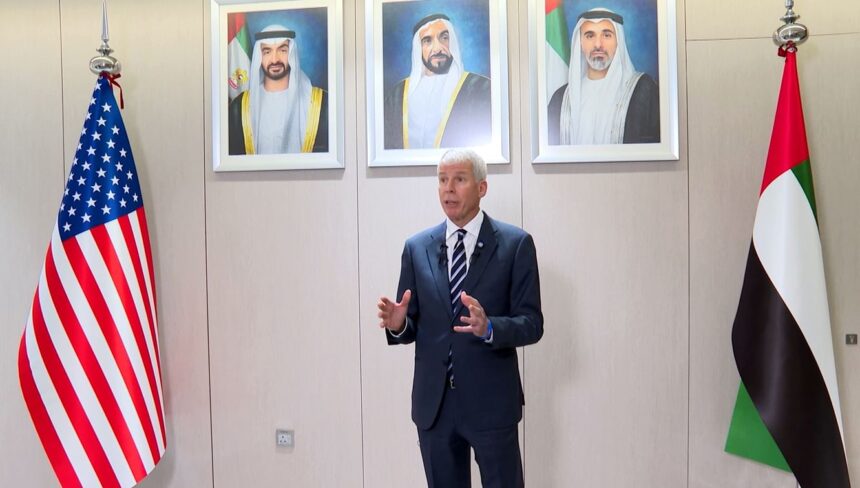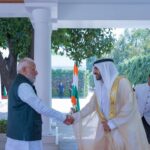The Secretary of Energy of the United States, Chris Wright, emphasized the strong and growing strategic association between the United States and the United Arab Emirates in the fields of energy, artificial intelligence (AI) and advanced technology update their visit to the EAU.
Wright, who is in the EAU as part of his first official international trip, described bilateral relations with the EAU as “rapid growth” in investment and joint cooperation. Its regional trip, which includes three countries, aims to strengthen ties with key geostrategic and energy allies.
Duration A visit to ADNOC HQ, Wright expressed his admiration for the early adoption of the EAU in their energy sector. “I think the EAA have an early engine bone in AI. I saw incredible progress today in the application of AI to their own energy system, and a great vision of where their future is going,” Wright told journalists. Significant cooperation predicted between the two nations both in energy and in AI, which imply significant investments in both directions, together with the continuous geopolitical cooperation between the two countries.
In response to a question about mutual investments, especially after the launch of the XRG company of the EAU, Wright explained that they are great opportunities for Emirati investments in the United States, as well as US investments. These include capital and technology flows.
He added that artificial intelligence will boost the next phase of energy demand, particularly for natural gas and electricity.
Wright said that his country is open to foreign investments and is working to empower the private sector and reduce costs, which makes it an attractive destination for investments in advanced and oil and oil energy sectors.
He clarified that oil and gas prices are influenced by free market forces and are not determined by any of the parties, and pointed out that the United States continues to produce oil at good levels, while natural gas production is growing rapidly. Ascent for ascent.
He pointed out that short -term price fluctuations are mainly due to market perceptions related to supply and demand, saying: “In the long term, I think we will see a gradual decrease in the balloons of oil and gas prices, and we hope that this will be this that this will be this will be this will be this, this will be this will be this.
Wright clarified that the decrease in prices does not necessarily mean a fall in the company’s profitability, stating that energy colleagues will continue to reduce production costs and face Ferwer government charges, which will positively affect the sector.
He stressed that the agenda of President Donald Trump focuses on reducing energy costs as a means to improve citizens’ living, boost corporate competitiveness and increase investments. He pointed out that the current administration of the United States aims to support the growth of energy demand through the expansion of artificial intelligence, the refusal of industries and the elevation of living standards.
He also highlighted new investment initiatives in the energy sector, including XRG, which focuses on investing in low carbon energy, chemicals, improving technological innovation and providing essential energy and products to improve the quality of people’s lives.
The stressed that AI requires significant investments and advanced experience, which provides fertile land for strategic associations between the EAU and the United States.
Wright explained that capital and technology flows are moving in both directions, praising the level of technology used in the production of oil and gas, as well as the first investments of the EAU in artificial intelligence technologies.
He said that the United States is preparing for a new phase of strong growth in the demand for oil and gas in the coming years, in parallel with the expected increase in production, noting that artificial intelligence will be a key factor in this growth and immerse itself in the increase in life.
He pointed out that President Donald Trump leads a commercial agenda based on the principles of achieving balance in international trade and the revitalization of the manufacturing sector in the United States, which contributes to creating local work opportunities and raising salary levels.
He explained that while the United States has a long leg open to imports, its commercial partners do not have an opening similar to STISARD exports. He added that the US administration is trying to achieve reciprocity, as well as stimulate local industries through tools such as rates.
He pointed out that thesis policies will contribute to strengthening economic growth in both the United States and around the world, despite the challenges that can accompany the transition phase.
Regarding relations with China and Iran, he said that preliminary negotiations are underway with China, expressing optimism about achieving an understanding that attends to the interests of both countries.
He affirmed that the main objective with respect to Iran is to end its nuclear program, emphasizing the importance of serious negotiations and collecting the commitment of the United States with the prevention of Iran to acquire a nuclear weapon due to the sequence of the world.
![]() Follow Emirates 24 | 7 on Google News.
Follow Emirates 24 | 7 on Google News.







